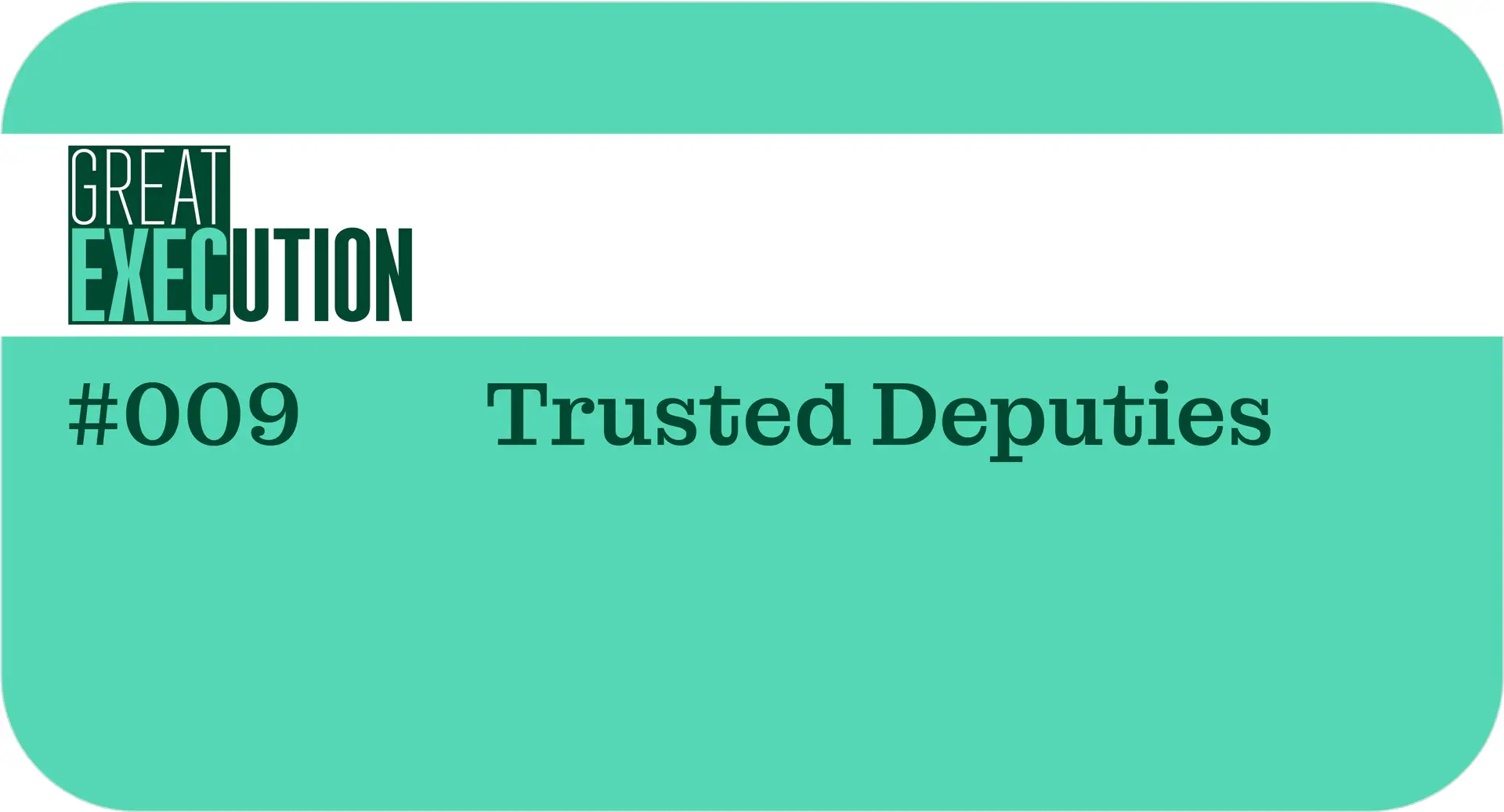Read time: 4 minutes
In this edition
Over the past few weeks, the topic of leadership effectiveness has reared its head, both in my advisory and coaching work and outside it.
Being a good leader is pretty tangible and straightforward when you first become a manager. But as you rise up the ranks, it gets harder. I experienced this in a rather abrupt way when, after managing teams of roughly five people, I took a senior leadership job managing eighty-five people.
It was at that point I became acutely aware of the importance of what I now call “trusted deputies”. It took me a while to get them in place (some were there already and were great, some were not). When I did, it changed my life and the lives of my team members as well.
This is the topic of this week’s Great Exec/ution Newsletter, and it is one of my favorite parts of leadership.
I hope you enjoy it. Let me know what you think.
Trusted Deputies
Great execution is fundamentally a team sport. You won’t succeed without a competent and motivated team, and the likelihood of their excellence is greatly increased by a great leader.
However, it also the case that the bigger the team, the harder it is for the leader to exercise direct oversight and influence. This begins the moment you become a manager of managers and only gets harder as you rise in an organization. As you ascend the ranks, your role shifts from being functional in nature to managerial. It’s imperative that it does.
So how do you ensure the team does what it needs to do independently and to a high standard? You find people to help you do this. I call these people “trusted deputies”.
What are we looking for?
The search for and development of “trusted deputies” is something I focus on with my advisory and coaching clients. A trusted deputy is ultimately someone who can manage a “portfolio” of work (and people) with near-complete autonomy and achieve their goals.
There are two ways you will recognize that you need a trusted deputy. One is that the role already exists in the org chart: there is a clear function that is being managed by someone. The other is that you feel the pain of that role’s absence because you spend an inordinate amount of time personally performing the function. This situation typically arises from of a deliberate business transformation or a period of significant growth.
Let’s assume the usual case, where there is someone already in the role. You first want to assess their capabilities along three dimensions:
- Functional Success: Are they effective in the role and meeting their functional goals?
- Bigger Picture: Do they work with their “heads down”, or are they capable of participating in bigger picture discussions in terms of strategy, how goals are set, etc?
- People Management: What is their management style? Do they effectively motivate members of their team, and does the team respond to and enjoy their leadership?
The first two capabilities are pretty standard in terms of evaluating competence. It’s the third that might be most important of all. Trusted deputies need to be more than just functionally competent: you want them taking the same careful and nurturing approach to their teams. You can’t hope to have a culturally aligned organization without this.
The Central Axiom of Management
The way that trust is built arises by first setting expectations. This is the core of the manager-employee relationship, and is something about which I have written in detail on my website. It is a principle I call the Central Axiom of Management:
Management is the grant of autonomy in exchange for visibility.
Autonomy is a simple concept: it means that, as long as a task gets done, the person doing it gets to decide *how* it gets done. But that doesn’t mean the manager closes her/his eyes. The employee provides visibility into how things are going. Over time, this creates the building blocks of trust.
The Synergy of Great Deputies
It can take a while to build your corps of trusted deputies. not everyone is ready from day one. Some need additional help and coaching to get there, and then they rise to the occasion. Some are not fit and need to be replaced—yes, replaced, because you cannot as a leader afford to have underperformance in your team.
As the group improves, though a remarkable thing happens. You start to get real synergy in the team. Your deputies will start to work together even when you’re not looking. The team will start to build its own cohesion, focus, and alignment. In my experience, the best teams develop to the point where they regularly outperform their targets and carry a genuine feeling of pride.
Conclusion
If great execution requires team work, then a sine qua non of great leaders is their ability to create new leaders who build the competence and character of the team. Trusted deputies go on to create more trusted deputies, and a thriving high-performing team.
LinkedIn Roundup
Here are the things I talked about this past week on Linkedin.
When you’re ready, there are two other ways I can help. Email me at hello@jddeitch.com for more information.
Business Advisory
I help growth-stage leaders and investors in B2B tech-enabled services businesses align strategy with execution. I focus on the twin engines of execution excellence—process and people—to transform your business, paving the way for growth and enhanced profitability.
Transaction Support
With 20+ years of operating experience and a substantial M&A track record, I help investors evaluate strategic and operational strengths and weaknesses and navigate post-deal risks to unlock value.
